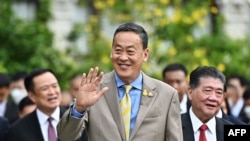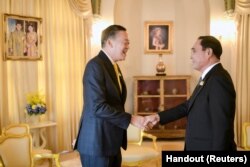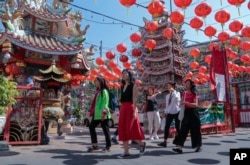Thailand's new civilian coalition government may seek greater engagement with Western democracies even as it continues to maintain ties with China forged by the previous military-led regime, analysts said.
But while the new Pheu Thai government may want to differentiate itself from that of Prayuth Chan-ocha — the general who led the 2014 military coup and was subsequently voted in twice as prime minister by parliament — appearances suggest a pivot away from China is unlikely.
In March, months before the May 14 election, Pheu Thai Party leader Srettha Thavisin, who is now prime minister, said his party would support increased trade and tourism with China. Within days of Srettha's election on August 22, Chinese envoy to Thailand Han Zhiqiang invited Srettha to meet Chinese President Xi Jinping in Beijing, Thai media Matichon reported.
Benjamin Zawacki, author of "Thailand: Shifting Ground between the US and a Rising China," said to VOA Thai in a September 1 email interview, "Perhaps to distinguish itself from those [previous] administrations — and because ideology and ideological consistency have never played a prominent role in Thai foreign policy — the incoming Pheu Thai-led government will more meaningfully engage the U.S. and other democracies."
Greg Raymond, lecturer in Southeast Asian politics and foreign relations at Australian National University, said that as a coalition government, Pheu Thai may be significantly constrained from changing policies set by its predecessor.
Pheu Thai "subscribes to the consensus that steering a middle course between China and the U.S. is the most appropriate policy for Thailand," he told VOA Thai in an email interview on August 30.
Internal politics
Thailand struggled to form a government for more than three months after the May 14 national elections.
The youth-oriented Move Forward Party received the most votes in the May 14 election but its efforts to form a government were thwarted when its leader, U.S.-educated Pita Limjaroenrat, fell 51 votes short of the majority needed from Thailand's bicameral National Assembly to clinch the top job. Pita's campaign promises had included developing a foreign policy less tied to Beijing.
Pheu Thai came in second in the nationwide vote. It ascended to power late last month after forming an unlikely coalition with 10 other parties, including two aligned with the military generals who staged the 2014 coup. Both houses of Parliament vote together for the prime minister under a constitution implemented by the military-controlled government. Longtime observers of Thailand's political scene say the new constitution is designed to protect conservative military-backed rule.
Pheu Thai members now hold the top spots in Thailand's foreign affairs and defense ministries, key policymaking entities. Onetime political activist Suthin Khlangsaeng is defense minister, the rare civilian to hold the post. Former Thailand trade representative Panpree Pahitthanukorn is the foreign minister and a deputy premier.
Suthin is expected to maintain friendly relations with China. From 2014 to 2017, Western nations shunned the new regime's offers to purchase military hardware, and the generals turned to Beijing, Reuters reported. In 2015, Thailand was one of the first countries to buy Chinese naval hardware. In 2017, the two nations signed a billion-dollar deal for the purchase of three submarines, according to Radio Free Asia.
After Thailand's 2019 elections, the U.S. led an effort among Western nations to normalize relations with the kingdom, despite Prayuth's continued military-influenced leadership.
In August 2019, the U.S. State Department approved a possible sale to Thailand of 60 Stryker infantry carrier vehicles with equipment and support at an estimated cost of $175 million, followed by a $137.17 million of sale of eight reconnaissance helicopters in September, according to Murray Hiebert, a senior associate of the Southeast Asia Program at the Center for Strategic and International Studies in Washington.
Panpree, a business-oriented technocrat, told the Thai newspaper Thairath in March that Pheu Thai's foreign policy would focus on promoting a regional digital economy using information technology for creating goods and services in Southeast Asia, ramping up trade negotiations and attracting more foreign investments.
Srettha, who spoke of reviving Thailand's pandemic-busted economy during the campaign, on Monday vowed to move quickly to relieve the country's economic problems in his inaugural speech to parliament. He plans to talk with U.S. President Joe Biden and key businessmen about investment opportunities in Thailand on the sidelines of the United Nations General Assembly in New York later this month, reported Prachachat.
Chinese investment
Raymond, the Australian National University lecturer, anticipates that the new Thai government will support more Chinese investment in existing projects such as the Eastern Economic Corridor and 5G infrastructure. The corridor includes Rayong, Chonburi, and Chachoengsao provinces, and China has made more than 10% of the project's total foreign investment from 2018 to this year's first quarter as Xinhua reported.
Chinese companies like Huawei and ZTE Corporation are partnering with Thai telecom companies in applying 5G in various industries, as well as launching a 5G hub in Thailand, the Bangkok Post reported.
"Pheu Thai has generally been in favor of increased economic integration with China," he noted.
According to the Board of Investment of Thailand, China last year channeled $2.3 billion to Thailand via industries such as electronics, automotive and data centers. The U.S. companies, meanwhile, invested $1.8 billion in Thailand through 33 projects.
Zawacki also said the new government may give more importance to a high-speed railway project initiated in 2010 with a construction agreement signed by the Thai and Chinese governments in 2014. The project, a line connecting Bangkok to Kunming in China via Laos, is worth $5.4 billion, AFP reported.
Progress has been slow. As of now, there is only a $5 billion construction contract for the section connecting Bangkok with Korat, a province in northeast Thailand that is the nation's largest. The line is part of a project that will link high-speed rail in Thailand with a rail line in Laos that is key to China's Belt and Road Initiative in Southeast Asia.
Zawacki said, "Given Pheu Thai's historically close relations with China, its desire to distinguish itself from the Prayuth administrations, and its status in Thailand's Northeast — still strong but in need of reinforcement — it stands to reason that the new government will give the rail greater priority."
This report contains material from The Associated Press.









